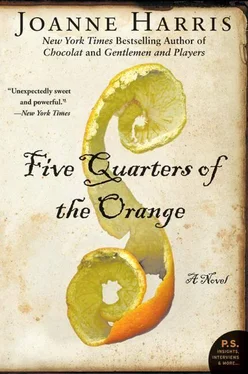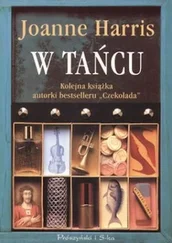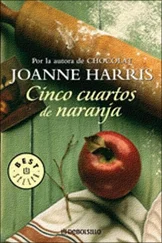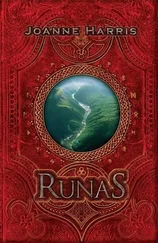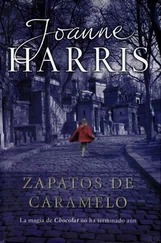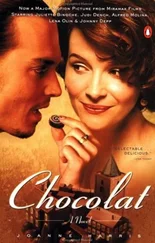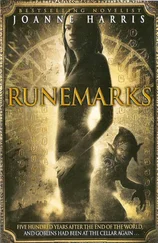“ Old Mother, ” I whispered hoarsely. “Old Mother. I wish. I wish. Make him stay. Make Tomas stay.” I whispered it quickly so that Tomas wouldn’t hear what I was saying, and then, when he didn’t come up the riverbank immediately I said it again, in case the old pike hadn’t heard the first time: “ Make Tomas stay. Make him stay forever. ”
Inside the crate, the pike slapped and floundered. I could make out the shape of its mouth now, a sour downturned crescent whiskered with steel from previous attempts at capture, and I was filled with terror at its size, pride at my victory, crazed, engulfing relief… It was over. The nightmare that had begun with Jeannette and the water snake, the oranges, Mother’s descent into madness…it all ended here on the riverbank, this girl in her muddied skirt and bare feet, her short hair scruffed with mud and her face shining, this box, this fish, this man looking almost a boy without his uniform and with his hair dripping…I looked around impatiently.
“Tomas! Come and look!”
Silence. Only the small sounds of the river plapping against the muddy hollow of the bank. I stood up to look over the edge.
“Tomas!”
But there was no sign of Tomas. Where he had dived down there was an unbroken creamy smoothness the color of café au lait with only a few bubbles on the surface.
“Tomas!”
Maybe I should have felt panic. If I’d responded there and then maybe I would have caught him in time, avoided the inevitable somehow…I tell myself this now. But then, still dizzy with my victory, my legs trembling with exertion and fatigue, I could only remember the hundreds of times he and Cassis had played this game, diving deep under the surface of the water and pretending they were drowned, hiding in hollows under the sandbank to resurface red-faced and laughing as Reinette screamed and screamed… In the box Old Mother slap-slapped imperiously. I took another couple of steps toward the edge.
“Tomas?”
Silence. I stood there for a moment, which seemed like forever. I whispered, “Tomas?”
The Loire hissed silkily beneath my feet. Old Mother’s slapping had grown feeble in the crate. Along the rotten riverbank the long yellow roots reached into the water like witches’ fingers. And I knew.
I had my wish.
When Cassis and Reine found me two hours later I was lying dry-eyed by the river with one hand on Tomas’s boots and the other on a broken packing crate containing the remains of a big fish, which was already beginning to stink.
We were still only children. We didn’t know what to do. We were afraid-Cassis perhaps more than the rest of us, because he was older and he understood rather better than we did what would happen if we were linked with Tomas’s death. It was Cassis who dived under and found Tomas under the banking, freeing his ankle from behind the root that had snagged him and pulling his body out. Cassis too who removed the remainder of his clothes and bundled them together, tying them with his belt. He was crying, but there was something hard in him that day, something that we had never seen before. Perhaps he used up his lifetime’s reserve of bravery that day, I thought afterward. Perhaps that was why he fled later into the soft forgetfulness of drink. Reine was useless. She sat on the bank throughout, crying, her face mottled and almost ugly. It was only when Cassis shook her and said she had to promise-to promise! -that she showed any reaction, nodding dimly through her tears and sobbing, Tomas, oh, Tomas! Perhaps that was why in spite of everything I never really managed to hate Cassis. He stood by me that day, after all, and that was more than anyone else did. Until now, that is.
“You have to understand this.” His boy’s voice, unsteadied by fear, still sounded oddly like an echo of Tomas’s. “If they find out about us, they’ll think we killed him. They’ll shoot us.” Reine watched him with huge terrified eyes. I looked over the river, feeling strangely indifferent, strangely unaffected. No one would shoot me . I’d caught Old Mother. Cassis slapped me sharply on the arm. He looked sick, but dogged.
“Boise! Are you listening?”
I nodded.
“We have to make it look as if someone else did it,” said Cassis. “The Resistance or someone. If they think he drowned …” He paused to glance superstitiously at the river. “If they find out he went swimming with us…they might talk to the others, Hauer and the rest…and…” Cassis gave a convulsive swallow. There was no need to say more. We looked at one another.
“We have to make it look like…” He looked at me, almost pleading. “You know. An execution.”
I nodded. “I’ll do it,” I said.
It took us a while to understand how to fire the gun. There was a safety catch. We took it off. The gun was heavy, greasy-smelling. Then came the question of where to shoot. I said the heart, Cassis the head. A single shot should do it, he said, just there at the temple, to make it look like a Resistance job. We tied his hands with string to make it look more authentic. We muffled the sound of the shot with his jacket, but even so the noise-flat and yet with a peculiar resonance that went on and on-seemed to fill the whole world.
My grief had gone deep, too deep for me to feel anything but an enduring numbness. My mind was like the river, smooth and shiny on the surface, filled with cold beneath it. We dragged Tomas to the edge and tipped him into the water. Without his clothes or identity tags, we knew, he would be virtually unidentifiable. By tomorrow, we told ourselves, the current might have rolled him all the way to Angers.
“But what about his clothes?” There was a bluish tinge around Cassis’s mouth, though his voice was still strong. “We can’t risk just tipping them into the river. Someone might find them. And know…”
“We could burn them,” I suggested.
Cassis shook his head. “Too much smoke,” he said shortly. “Besides, you can’t burn the gun, or the belt, or the tags.” I shrugged disinterestedly. In my mind I saw Tomas roll softly into the water, like a tired child into bed, again and again. Then I had the idea.
“The Morlock hole,” I said.
Cassis nodded.
“All right,” he said.
The well looks much as it did then, though someone has placed a concrete plug over it nowadays so that children don’t fall in. Of course, we have running water now. In my mother’s day the well was the only drinking water we had apart from the overspill from the rain gutter, which we only used for watering. It was a giant brick cylindrical affair, rising some five feet off the ground, with a hand pump to draw off the water. At the top of the cylinder, a padlocked wooden lid prevented accidents and contamination. Sometimes, when the weather had been very dry, the well water was yellow and brackish, but for most of the year it was sweet. After reading The Time Machine, Cassis and I had gone through a phase of playing Morlocks and Eloi around the well, which reminded me, in its grim solidity, of the dark holes into which the creatures had vanished.
We waited until night was almost falling before returning home. We carried the bundle of Tomas’s clothes, hiding it in a thick patch of lavender bushes at the end of the garden until nightfall. We brought the parcel of magazines too-not even Cassis was interested in looking at it after what had happened. One of us would have to make some excuse to go out, said Cassis-by that, of course, he meant I should have to do it-quickly retrieve the bundle and throw it, along with the unopened parcel, into the well. The key to the padlock hung on the back of the door with the rest of our house keys-it was even labeled “Well,” Mother’s passion for neatness being what it was-and could easily be removed and replaced without Mother noticing. After that, said Cassis with that unaccustomed harshness in his voice, the rest was up to us. We had never known, never heard of, a Tomas Leibniz. We had never spoken to any German soldiers. Hauer and the others would keep their mouths shut if they knew what was good for them. All we had to do was look stupid and say nothing at all.
Читать дальше
